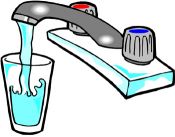
Site Owned by Upper Valley Lake Sunapee Regional Planning Commission
COVID-19 NOTICE: The May collection in Lebanon has been canceled for the safety of the public, crew, and staff. There is a Stay-at-Home order in force through May 4, 2020. Please refer back to this website for future cancellations dependent upon COVID-19 updates. Stay safe and be well.
These household hazardous waste collections are provided to reduce the amount of hazardous materials being disposed of in landfills and incinerators, or dumped down the drain and into our drinking water. Click here for the latest "New Hampshire schedules" or "Vermont Schedules."

Hazardous waste disposal is expensive, but it is much cheaper than cleaning up contaminated water or paying for health issues caused by contaminated drinking water.
Please do NOT bring latex paint to HHW collections. It is not considered hazardous. See our flyer on proper management of latex paint.
Latex paint brought to a collection will be sent back home with you. This may change if New Hampshire adopts PaintCare. Vermont has adopted the program and accepts all architectural paint through PaintCare.
Small businesses and institutions are welcome to attend. They must pre-register with the coordinating sponsor at least three weeks in advance of the collection event. A fee will be determined prior to the event which will be due before or at the event.
On-site collection arrangements may be made directly with the sponsor's waste hauler or any licensed hauler when there is a large quantity of waste or it could not be safely transported to a collection site. You can obtain a list of licensed hazardous waste haulers from NH Department of Environmental Services for New Hampshire and VT Waste Management Division for ANR for Vermont.
Product Stewardship for Household Hazardous Waste?
The recent success of extended producer responsibility (EPR) programs for paint, electronics, and other products has sparked interest in similar approaches for other HHW. Reduction, reuse, and recycling of HHW can reduce the generation of additional hazardous substances. Appropriate disposal protects human health and the environment. EPR programs for products categorized as HHW are also intended to create economic and operational efficiencies in the collection and management of toxic products that are not currently addressed by product-specific EPR legislation (e.g., paint, batteries, thermostats, fluorescent lamps). Check out the Product Stewardship Institution's information about HHW and the future of EPR.
SITE SEARCH